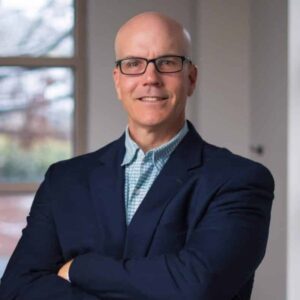Podcast: Play in new window | Download

Reading Time: 2 minutes
When the energy crisis hit the United States in the late 1970s, few could have predicted that it would spark the creation of a family business that would stand the test of time. For Scott Groves, now CEO of CUI Distribution in Greenville, South Carolina, that story began with his father’s vision to meet a simple but vital need: helping people heat their homes affordably and safely.
Kerosene Heaters to a Heating Products Leader
Back then, gas lines wrapped around city blocks, inflation soared, and interest rates climbed into the double digits. Scott’s father, then a furniture retailer in Lansdale, Pennsylvania, saw an opportunity. By selling kerosene heaters directly in his store, he tapped into a growing demand for alternative energy sources. That small pivot turned into a booming venture—within three years, he and his partner sold over a million heaters across Pennsylvania, New Jersey, and Delaware.
With the business’s early root in heater sales, it evolved into CUI Distribution, known for carrying a massive inventory of heating-products from top manufacturers. The company emphasizes fast availability and wide selection.
Adapting to Change While Staying True to Core Values
Scott’s leadership reflects a deep respect for the past and a clear vision for the future: “We’ve always been about meeting real needs. The products may change, but that mission doesn’t.” His story highlights how innovation and adaptability can sustain a business across generations.
CUI’s evolution—rooted in resilience, foresight, and family-values—serves as a reminder that smart, sustainable growth isn’t just about reacting to challenges, but anticipating them. It’s a philosophy that mirrors the principles of intelligent investing: long-term thinking, disciplined decision-making, and trust in the foundations that endure.
More From Scott Groves
Please be sure to subscribe to our podcasts as we will be interviewing Scott on upcoming podcasts where he shares valuable insights on principles of stewardship, adaptability, and long-term thinking that drive both business and investing success.
Scott Groves Bio
Scott Groves is the Chief Executive Officer of CUI Distribution, a leading heating products supplier headquartered in Greenville, South Carolina. With more than four decades of experience in the industry, Scott has guided CUI through significant growth and transformation since taking over the family business founded by his father in 1978.
Under his leadership, CUI has expanded from its origins in kerosene heaters and cans to become a trusted distributor serving residential, commercial, and industrial heating markets across the nation. Known for his practical leadership style and deep commitment to customer service, Scott emphasizes innovation, reliability, and family values as the foundation of CUI’s success.







